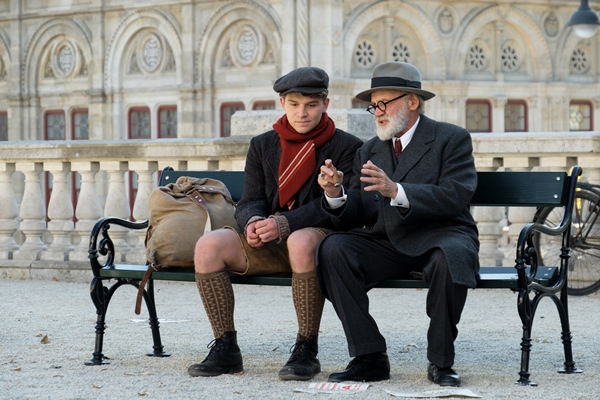
Since so many coming-of-age stories have dealt with the complexities of love and self-identity, it’s surprising it took this long for one to feature Sigmund Freud as a supporting character. That’s the hook of The Tobacconist, where one young man’s transition to adulthood parallels the rise of the Third Reich in Austria.
The result is a moody but pleasant surprise, with solid lead performances and a blend of gritty and surreal camerawork elevating an occasionally drifting narrative. Even though fascism is the antagonist to 17-year-old Franz’s growth and the father of modern psychoanalysis is his guide, rarely do the characters feel clichéd as they meaningfully grow and adjust to the film’s dark conflicts.
It begins and ends with a storm literally brewing overhead Austria and Franz (Simon Morzé), who we first meet underwater in the lake close to his mother’s cottage. Not much of a people’s person, he certainly fares better than her current lover and benefactor, who is semi-comically electrocuted during a swim in that very lake. With revenue low, Franz’s mother sends her son to Vienna to apprentice for her ex-lover, Otto Trysnvek (Johannes Kirsch), a World War I veteran turned tobacconist who also sells newspapers and the occasional pornographic magazine. He demonstrates a worldly knowledge of his business (“Tobacco sells pleasure and desire, and sometimes vice”) and teaches Franz to observe the customers and anticipate their needs.
It’s through this apprenticeship that Franz meets Dr. Freud (the late Bruno Ganz), one of Otto’s regular cigar customers. It’s ironic casting, almost the polar opposite of Ganz’s Hitler performance in Downfall that has become ingrained in pop culture through innumerable “Hitler Rant” parodies. Ganz successfully plays Freud as simultaneously well versed in, and perplexed by, the human psyche. Freud becomes a solid foil for Franz, someone still learning to express his inner thoughts. This is especially the case when it comes to understanding sexual desire and love.
Much of Franz’s journey feels like textbook sexual psychoanalysis. His actions are divided between figures of his psyche, with Freud being the moral center (ego) guiding him through conflicts between Otto’s moral conscience (superego) and his newfound sexual fantasies, or id. That id is the beautiful yet fatale-like Bohemian dancer Anezka (Emma Drogunova), whom Franz romantically pursues with a Lacanian obsession for her as an unattainable object of desire. Their bond isn’t so much cat and mouse as it is temporary ecstasy: desirable in the moment but always leaving Franz more flummoxed than fulfilled. And Freud, for all his papers on sex and libido, cannot offer much concrete advice beyond telling Franz to take a risk on love while there’s still time.
Time, and freedom as we soon see, is of the essence. At first, the Nazi presence in Vienna amounts to individual biases, with Otto freely kicking out a customer who demands a National Socialist newspaper from his shop. But once Hitler occupies Austria, the film makes it clear how much is at stake for Freud, a Jewish intellectual, and Otto, a citizen who serves Jewish and Communist customers. Swastika flags hang everywhere, the shop is vandalized, and one shocking moment in a cabaret indicates how strongly the Reich has its grip on Vienna. However, The Tobacconist’s hopeful bleakness gives Franz a taste of what’s to come while exploring how he retains his humanity against the growing oppression.
Freudian themes extend into the story line as well as Franz’s mental struggle. Dream sequences reminiscent of Twin Peaks or The Sopranos project the protagonist’s sexual and familial fears. None of them are brainteasers, but they definitely feel at home in a movie involving Freud. Even more noteworthy are the momentary sequences of wish fulfillment outcomes, encounters Franz imagines before he’s awakened to their non-cathartic outcomes. Whereas the single usage of one of these motifs would have felt clichéd, the repetition adds dimensions to the the teen’s struggle against problems bigger than himself.
This is a more intimate Nazi-era historical melodrama than the recent Resistance; it usually takes place around the same few locations. Additionally, as a graduate of Clark University—the only university Sigmund Freud ever visited in the United States—it’s nice to see the historical figure depicted in any contemporary medium.






Leave A Comment